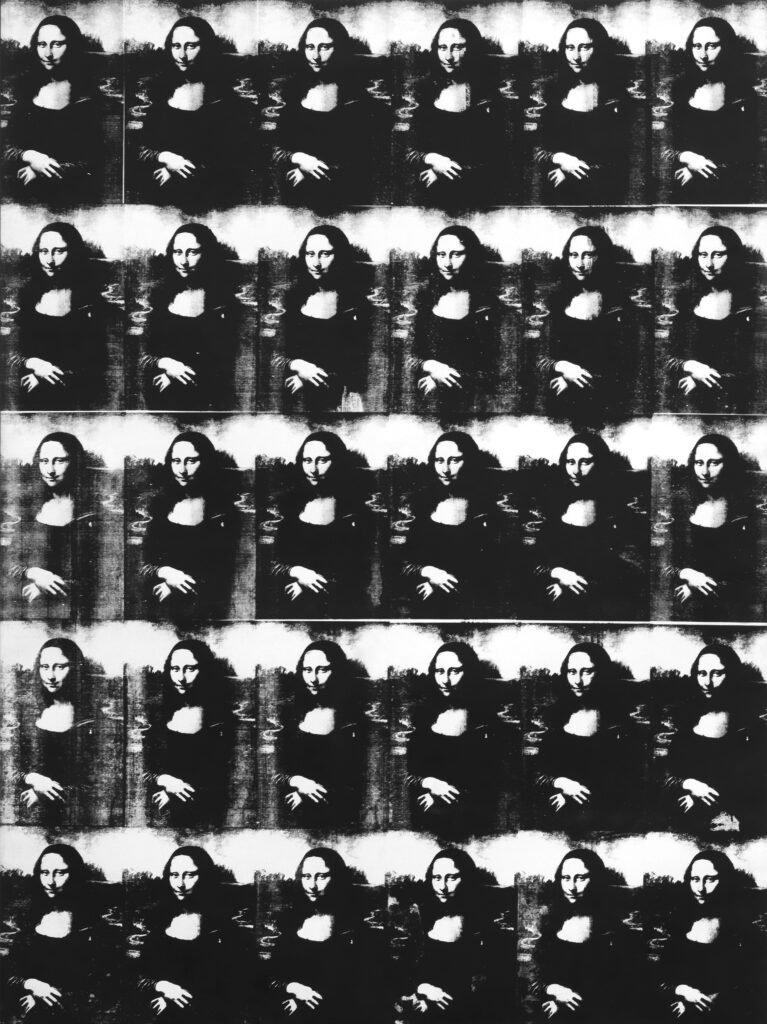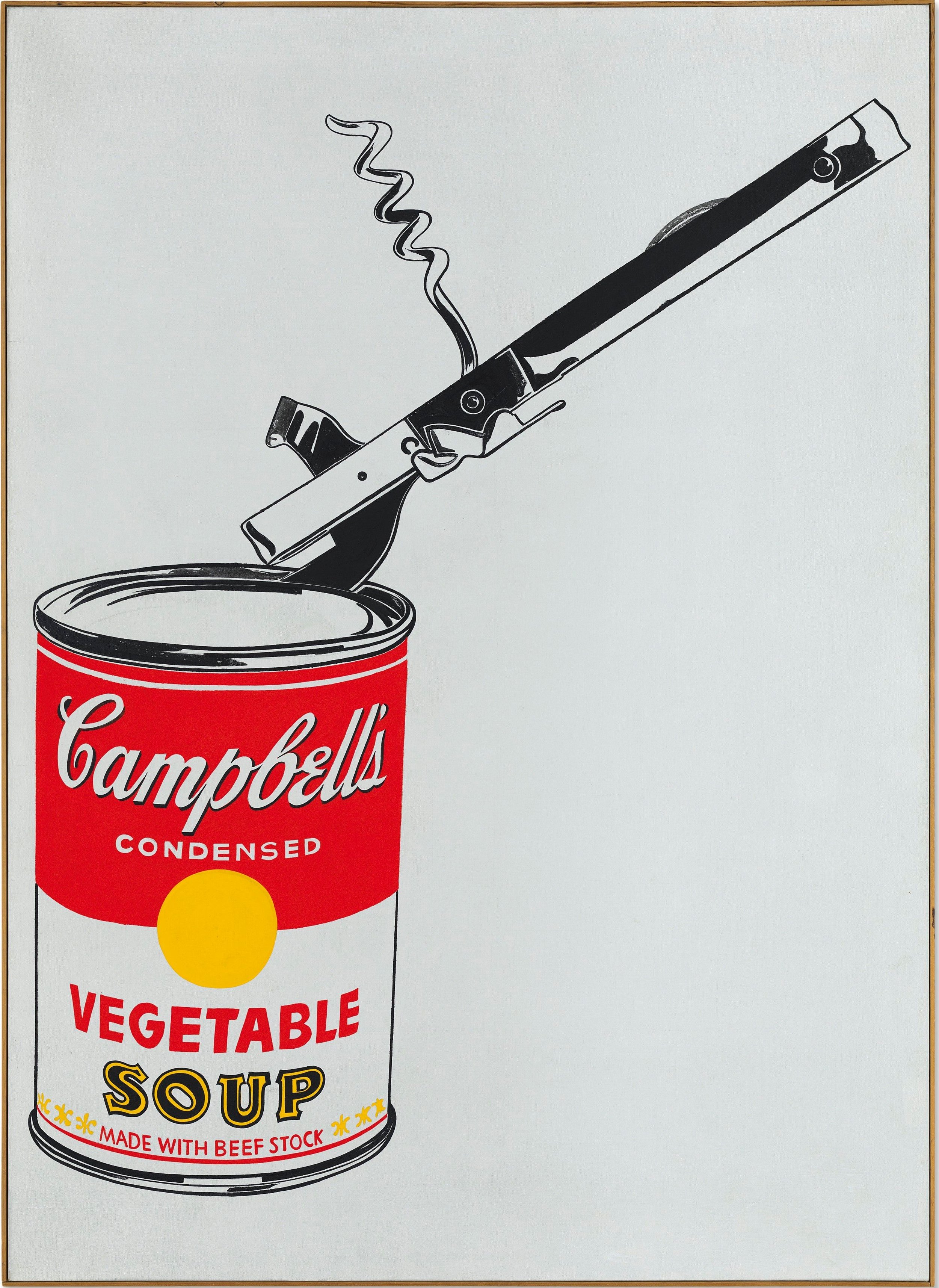Warhol in the EV
Andy Warhol, Thirty Are Better Than One, 1963. Synthetic polymer paint and silkscreen on canvas. ©The Andy Warhol Foundation for the Visual Arts, Inc. / Licensed by Artists Rights Society, New York.
Thirty Are Better Than One, an exhibition of over 100 artworks by Andy Warhol, opens May 10 at the Brant Foundation, 421 E. 6th St. The show is curated by famed art collector and Warhol pal Peter M. Brant and runs through July 31.
Andy Warhol, Big Campbell’s Soup Can with Can Opener (Vegetable), 1962. Casein and graphite on linen, 72X52 in. ©The Andy Warhol Foundation for the Visual Arts, Inc. / Licensed by Artists Rights Society, New York.
Drawn largely from Brant’s extensive Warhol collection, the survey spans the entirety of the Pop Art god’s illustrious career, from his early drawings and intimate Polaroids to instantly recognizable silkscreens and sculptures. Brant befriended Warhol in the late 60s and went on to become one of the world’s foremost collectors of his work. Brant was publisher of Warhol’s Interview Magazine and collaborated with the artist on two films Andy Warhol’s L’Amour in 1973 and Andy Warhol’s Bad in 1977.
Peter Brant, 2013
Thirty Are Better Than One takes its title from Warhol’s important artwork from 1963. The eponymous work depicts 30 scaled-down, silk-screened images of Da Vinci’s Mona Lisa, showcasing the acute interest in mechanical repetition, the excess of images, and the disruption of art world hierarchies that defined the artist’s practice. Highlighting Warhol’s unparalleled ability to chronicle the visual culture of his time, the exhibition at The Brant Foundation explores his avid experimentation with numerous media through a highly cultivated artistic language, bringing into focus the artist’s innumerable contributions to the Pop Art movement and 20th-century American art in a staggering display.
Shot Light Blue Marilyn, 1964
Among Brant’s first purchases of work by Warhol were Campbell’s Soup Can (Chicken with Rice), (1962) and Shot Light Blue Marilyn (1964), one of Andy Warhol’s most iconic works. Brant has continued to collect important works from each decade of the artist’s practice. Drawing from Brant’s extensive collection, Thirty Are Better Than One highlights Brant’s close relationship with the artist, which started with their first meeting in 1967. Their friendship extended into the realm of collaboration: among other endeavors, Brant produced two films with Warhol—L’Amour (1973) and Bad (1976).
The exhibition includes a body of Warhol’s earliest works, made in the 1950s. After moving to New York, Warhol initially worked as a commercial illustrator, laying the groundwork for his future advances in the Pop Art movement. Ink, copper, and gold leaf recur as media during this formative period, which saw the creation of artworks such as Elvis Presley (Gold Boot) (1956), who was a frequent subject of Warhol’s work; and Mae West (1956), a fantastical copper leaf appliqué imagining the actress’s shoe.
A Warhol soup can displayed during the 2013 show at the Brant Foundation’s Greenwich, CT, location.
In the 1960s, Warhol started working within the Pop Art movement and developed what is now his most notable style: the photographic silkscreen technique. The exhibition presents iconic images that reflect the growing idolization of the celebrity persona, such as Licorice Marilyn (1962) and Liz #5 (Early Colored Liz) (1963), and explores his use of everyday, commercial imagery, seen in his facsimiles of product packaging for Brillo pads and Campbell’s soup—some of his most instantly identifiable artworks. Works on view also include Most Wanted Men No. 5, Arthur Alvin M. (1964) and 12 Electric Chairs (1964), part of Warhol’s Death and Disasters series, which examined the darker uses of mass media and its displays of violence.
Another shot from the 2013 Greenwich show.
In the 1970s, Warhol experimented with abstraction and turned to new formats to produce work, although his obsession with image-making is seen throughout. The exhibition includes works from his Skulls series (1976), for which he worked from posed still-life photographs of skulls to capture seemingly endless investigations of light and color, as well as works in which he pared down his subjects to solely examine the effects of shadows.
A piece from Warhol’s 1976 Skulls series
In his later practice, Warhol reflected on faith, morality, and loss through the lens of his own Catholic upbringing, along with other subjects that were increasingly political in nature. The exhibition features some of the artist’s final works before his death in 1987, including works from his far-reaching 1986 series centered around Da Vinci’s The Last Supper. Shown together, Warhol’s works explore not only his inventive appropriation of the imagery of popular culture, but also the contradictions that exist in American life.
Campbell’s Soup Can (Chicken with Rice), 1962
The Brant Foundation inaugurated its New York space in 2019 with a solo exhibition of works by Jean-Michel Basquiat, reuniting the East Village with a seminal figure of its past. Now, with Thirty Are Better Than One, the Foundation brings to the space yet another leading artist of the postwar New York art scene, presenting the finest examples of Warhol’s work from every period of his vast practice.
The Brant Foundation’s first East Village show, Jean-Michel Basquiat, 2019
The exhibition includes an exciting new line of merchandise created in collaboration with The Warhol Foundation and the Artist Rights Society (ARS), which will be exclusively available at The Brant Foundation Shop starting May 4, 2023.
The Brant Foundation is pleased to welcome Tiffany & Co. as the lead sponsor of this exhibition. It is a privilege to partner with a company that has a special history of collaborating with Andy Warhol at the start of his career in New York. The Brant Foundation will be exhibiting some of these collaborations such as the unique work Pin the Tail on The Donkey, a beautiful folding screen created for Tiffany’s window in 1954.
Peter Brant and The Brant Foundation would like to acknowledge Stephanie Seymour Brant for her continuous, unwavering support in realizing this exhibition.









